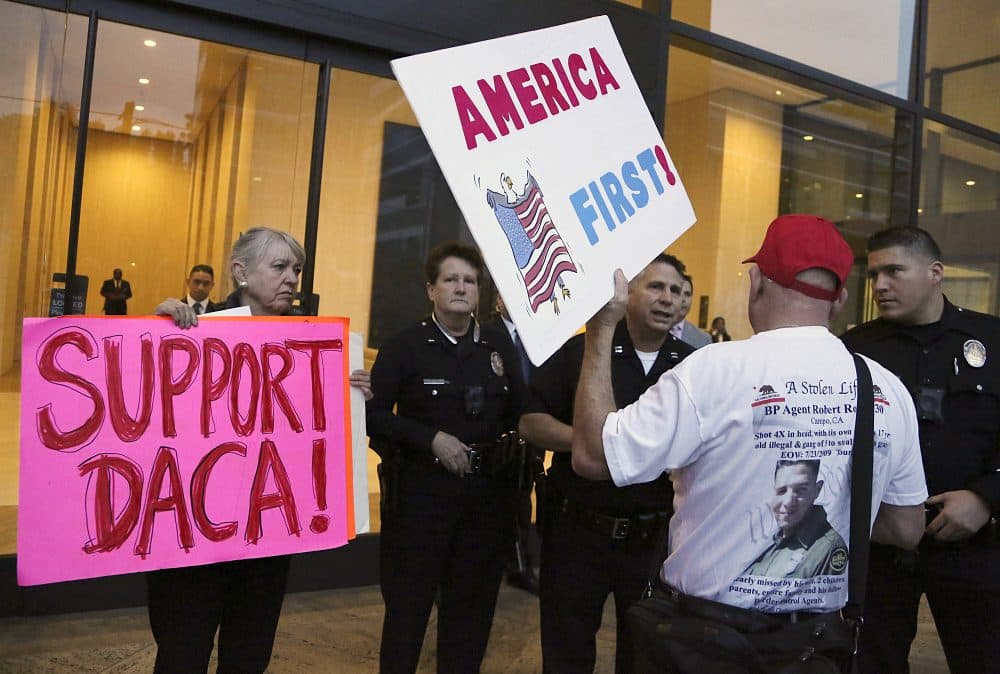Advertisement
Commentary
Say 'No' To The Wall And 'Yes' To Dreamers

President Trump is proposing a grand bargain: protection for the DREAMers — the young people brought to this country without status when they were children — if Congress funds his southern border wall. Trump is asking for $18 billion, a fraction of what the Department of Homeland Security estimates will be at least $21.6 billion and the Brookings Institution estimates can be as high as $70 billion.
The obvious objection to this plan is that a wall is an exercise in futility. Right now, 700 miles of our 2,000-mile-long southern border has an existing barrier. The remainder does not, either because the land is privately owned, or the terrain is inhospitable to having a structure erected on it, or the wall would portend environmental destruction to adjacent communities. It’s also just a bad idea. Many have pointed out that a $100 ladder is all that is needed to scale it. Moreover, the largest percentage of undocumented immigrants in the U.S. have overstayed their visas, not crossed a border. One large population of undocumented immigrants in Boston? They’re from Ireland.
But the less obvious and more salient objection is that we need less, not more immigration enforcement. The better bargain is for Congress to not only deny funding for Trump’s wall, but to refuse to appropriate any funding to the Immigration and Customs Enforcement (ICE) agency for any immigration arrests until common sense and compassion return to our immigration policy.
This is a reasonable idea that has precedent. Congress is tasked to fix problems through legislation and funding — the power of the purse is probably the most impactful power there is, and Congress knows how to wield it. Last March, for example, Attorney General Jeff Sessions announced his intent to prosecute marijuana offenses in states that had legalized medical marijuana. In response, a bipartisan group of legislators wrote language into the May 2017 appropriations bill that prevented the Department of Justice and the Drug Enforcement Agency from using any of its funds to interfere with state laws pertaining to marijuana. Without funding from Congress, Sessions couldn’t follow through on enforcement. (This may happen again to his new policy proposal to prosecute state drug offenses.)
...we have an “illegal immigration problem” not from porous borders, but because Congress has cut off all pathways for people to earn status.
Before Trump ended priorities for deportation, ICE had internal policies and directives that prioritized who would be arrested or deported for immigration violations. This discretion is a critical function of any law enforcement action, but it’s especially important when enforcing immigration law since immigration violations are not crimes — they can include leaving home without a green card or doing volunteer work on the wrong visa — and apply to both undocumented persons and lawful immigrants.
The lack of priorities means everyone is treated the same. ICE is deporting combat veterans who committed drug offenses and mothers whose crime was securing fake documentation for the sole purpose of employment. ICE is also deporting people who have done everything they can under the confines of the law to show good faith: Parents of citizens who, for years, have attended regular ICE check-ins and individuals married to citizens who show up at immigration interviews to affirmatively apply for green cards.
Advertisement
The policy of mass arrests and deportations is cruel, expensive and detrimental to our country. It is also a relatively new approach. In 1996, Congress radically changed the immigration law to be “tough on immigration” for the same silly reasons we thought mass incarceration was “tough on crime.” At the time, lawmakers promised immigration reform once the borders were secure, but that’s never happened. Instead, we have an “illegal immigration problem” not from porous borders, but because Congress has cut off all pathways for people to earn status.
When Congress does offer status — as with the DREAMers -- good things happen. Ninety-five percent of DREAMers found jobs or education, 70 percent went to college, 12 percent bought houses, 6 percent started businesses, and all paid $2 billion in federal and state taxes.
DREAMers are proof of the benefits our country receives when we give legal status to all instead of irrationally withholding it.
Economists overwhelmingly agree that we need immigrants to make our economy function. Small businesses, responsible for the growth of our economy, are opened twice as often by immigrants. Trump's efforts to deport and limit immigration are already having unintended consequences: Colleges and universities are cutting staff and programs to offset the drop in foreign student enrollment and tech companies are choosing to open new offices in Canada because of its more favorable immigration policy. Trump's "America First" crackdown on immigrants is costing America jobs.
DREAMers are proof of the benefits our country receives when we give legal status to all instead of irrationally withholding it.
Instead of building a wall or spending billions of dollars to arrest and deport millions of people, Congress should finally enact comprehensive immigration reform — not just for DREAMers, but for all those who contribute. That is a bargain that is long overdue and desperately needed.
